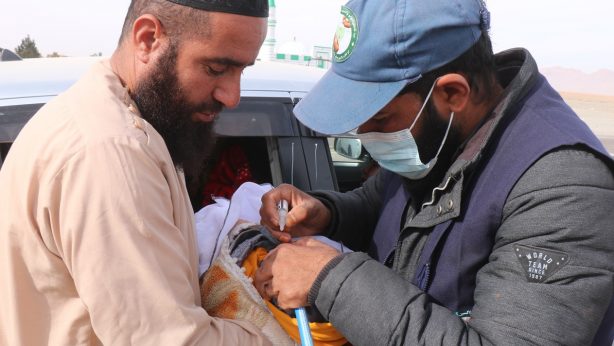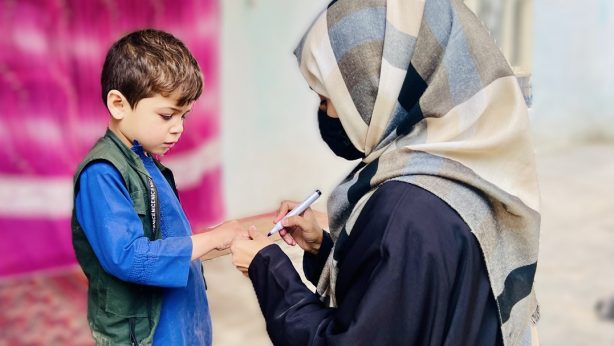Ghuncha Gul: A Living Example of the Importance of the Polio Vaccine

Hosai Ahmadzai
Kabul, Afghanistan – On a relatively warm day, as Kabul’s streets bustle with their usual crowds, a man sits in his wheelchair, straining to push its tires forward as he moves along, selling prayer beads and miswaks to passersby.
This is 40-year-old Ghuncha Gul, who contracted polio as a child, which robbed him of the ability to walk in both legs.
With the pain and hardship of the disability inflicted by polio visibly etched on his face, Ghuncha Gul earns a living for his family by selling prayer beads and miswaks.
He recalls that his life’s difficulties began the day he contracted polio, which paralyzed both of his legs.
“I was about 11 years old when I contracted polio and became paralyzed in both legs. My father took me to many hospitals for treatment, but to no avail, as there is no cure for this disease,” he adds.
 This is 40-year-old Ghuncha Gul, who contracted polio as a child, which robbed him of the ability to walk in both legs © Polio Free Afghanistan/ 2024/ Hosai Ahmadzai
This is 40-year-old Ghuncha Gul, who contracted polio as a child, which robbed him of the ability to walk in both legs © Polio Free Afghanistan/ 2024/ Hosai Ahmadzai
At that time, according to him, there was little awareness about polio and vaccines were scarce. Had he been vaccinated, he would not have been in this condition today.
He says that despite the challenges, he has persisted in his work, as he is the sole provider for his family, who live in a rented house.
Speaking about how he came to selling prayer beads and miswaks, he said: “Given my situation, I chose this work because I can do it while sitting in a wheelchair, without relying on others for help.”
Navigating Kabul’s streets, which are not accessible for people with disabilities, presents significant challenges for wheelchair users. “The city’s roads aren’t suitable for wheelchairs. I cannot access many places, and because of this my wheelchair frequently gets damaged, requiring constant repairs,” he explains.
He adds that while the earnings from his small business are insufficient to meet his family’s needs, he is still happy that he can provide for them on his own.
He says, “Although our economic situation is poor, I struggle every day for my family. My wife and three children have hope for the future, and I strive to give them a better life.”
As a polio victim, Ghuncha Gul views vaccines with utmost seriousness. He emphasizes, “If I had been vaccinated as a child, I wouldn’t have contracted polio or become disabled. Vaccination against polio and other viral and contagious diseases is essential for children. Families must not neglect this.”
 Ghuncha Gul says, “I was about 11 years old when I contracted polio and became paralyzed in both legs. My father took me to many hospitals for treatment, but to no avail, as there is no cure for this disease” © Polio Free Afghanistan/ 2024/ Hosai Ahmadzai
Ghuncha Gul says, “I was about 11 years old when I contracted polio and became paralyzed in both legs. My father took me to many hospitals for treatment, but to no avail, as there is no cure for this disease” © Polio Free Afghanistan/ 2024/ Hosai Ahmadzai
He urges all families to administer the vaccine to their children so they remain protected from polio and other dangerous diseases. “Don’t be careless about vaccines,” he stresses. “They are crucial for children’s futures, helping to safeguard them from the challenges I now face.”
Ghuncha Gul’s story is inspiring for many people. Haji Zahir, a shopkeeper in the same aera who knows him well, says, “His situation always saddens me. I wish he hadn’t missed out on the polio vaccine during childhood and hadn’t suffered from this terrible disease.”
Reflecting on Ghuncha Gul’s difficult life, Haji Zahir emphasizes the importance of vaccination: “It’s vital that families pay attention to the polio vaccine. Otherwise, many other children will face the same difficulties as Ghuncha Gul due to a lack of vaccination. It’s our collective responsibility as a society to ensure that all children receive their vaccines.”
Unfortunately, Ghuncha Gul is not the only victim of polio due to his family’s neglect. The issue persists, with many misinformed families still refusing to vaccinate their children.
Health professionals warn that such families are putting their children’s lives at great risk, as polio is a deadly and paralyzing disease that has no cure and can only be prevented through vaccination.
As a result, every year in the country, numerous children are paralyzed by polio because their families did not vaccinate them. These children later become a burden on both their families and society.


